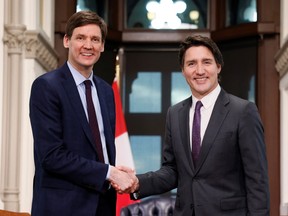No amount of federal cash will permanently fix this mess. The premiers must be willing to explore new ways to revive the patient.

Who can forget Paul Martin’s passionate 2004 pledge that he would fix health care “for a generation” with his $41-billion transfer-payment boost to the provinces? Why, just look at what great shape health care is in today!
Oh, you’re not convinced? Those long ER waits, your missing family doctor and the difficulty in obtaining routine tests have left you exhausted and frustrated? Inside and outside the health-care community, people feel your pain.
Sign up to receive daily headline news from Ottawa Citizen, a division of Postmedia Network Inc.
Thanks for signing up!
A welcome email is on its way. If you don't see it, please check your junk folder.
The next issue of Ottawa Citizen Headline News will soon be in your inbox.
The question, though, is to what extent another huge federal injection of cash will actually alleviate the suffering.
When the prime minister and the premiers meet on Tuesday, they’ll discuss how much new — and what proportion — of health funding should come from the federal government. The premiers want the federal share upped to 35 per cent of health-care costs; the feds currently cover 22 per cent. Meanwhile Prime Minister Justin Trudeau, having learned a thing or two from past negotiations, wants conditions on the cash: a focus on improved surgery wait times, primary care, mental health and long-term care homes. The feds also want proper data-gathering; it would be helpful to know if those transferred tax dollars actually make a difference.
All well and fine. But provinces can’t simply lay their health-care woes at the feet of the federal government. While the COVID-19 crisis exposed the fragility of care across sectors — the outrageous conditions in long-term care, for instance — such concerns have existed for years. Federal cash has never “fixed” these problems, let alone “for a generation.” Indeed, in some cases it may have had the opposite impact: allowing provincial governments a reprieve from embracing long-term solutions for their ailing and sclerotic health-care systems.
In fact, it took the COVID crisis to actually spur a trickle of innovation. In Ontario, while the Ford government has pledged new hospitals and long-term care beds, it has also taken baby steps into other forms of health delivery. It recently announced plans to offer OHIP-covered cataract, hip and joint-replacement surgery outside hospitals. Ontario pharmacies are now able to prescribe for 13 routine ailments. New approaches to recruiting nurses and doctors are underway.
That’s just Ontario. Other provinces are also dabbling in fresh ideas. Each will (hopefully) learn from the experience of the others.
What they also must learn is that while federal money is very nice (and the feds make convenient scapegoats when something goes awry), no amount from the federal treasury will solve all health-care problems. A willingness to explore different delivery methods — yes, some of them involving the private sector — is the only route to improving care.
For this generation — and the next.
-

Kurl: Playing health-care hero will be tricky for the premiers and the PM
-

VanderBent: Home-care focus can make new federal health funding go further


